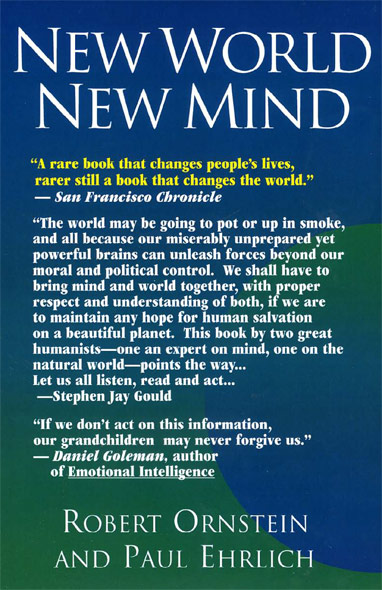
New World, Same Mind?
Andrew Boden | January 18, 2023
Watching the Worldometer population clock online can be a staggering thing—how fast the numbers climb, never appearing to slow, always rising. Two weeks ago, the United Nations announced that the earth’s human population had hit eight billion. By 2050, there’s slated to be almost ten billion of us on a planet increasingly facing a procession of what Robert Ornstein and Paul Ehrlich called in their 1989 book, New World New Mind “slow-motion disasters.” Like watching the Worldometer, it’s easy to feel that those disasters are coming faster and faster.
There were 5.4 billion of us in 1991, the year that I read Ornstein and Ehrlich’s call to a new way of thinking about ourselves, our minds, and our world. The central idea in New World New Mind struck me as a crucial one: our minds were adapted not for the modern world we find ourselves in, but rather the small tribal groups we lived in tens of thousands of years ago.
The mental tools that we depended on back then (our limited perceptions and quick reflexes to handle sudden threats) have remained essentially unchanged to this day. We can react swiftly to a twig snapping behind us as a cougar stalks us, but we don’t see the slow rise of carbon dioxide in our atmosphere or notice the gradual depletion of a freshwater aquifer.
More locally for me, it’s not until I’m on a ferry leaving my home city of Vancouver that I see that its skyline looks as if someone smeared it with a nicotine-coloured highlighter. And yet, every day, I walk out into that same pollution smog, glad for the “fresh air” in a local mountain park.
Ornstein and Ehrlich argue that the human race will never evolve naturally in time to be able to cope with its increasingly complex and runaway circumstances. What humanity requires, they write, is a rapid change-of-mind process they call “conscious evolution.” They define that as a willful shift towards a greater perceptual and cognitive faculty that allows us to see solutions and take appropriate actions that will move us out of this danger zone.
Thirty-two years after I first read Ornstein and Ehrlich’s astute book, I wondered: are there any signs that our minds are evolving? Catching up to the new world in which we find ourselves? If you’ve been watching media reports about the climate dramas across the planet, it’s hard not to feel pessimistic. There’s a frightening parade of ecological problems that seem too large and complicated to even begin to resolve.
Lost in all the disaster reports, however, may be clues that our minds are starting to adapt. If our perceptions are so limited that we don’t notice gradual changes around us, that may also include not catching slow adaptations in our mindset.
One sign for me is the increasing availability of mainstream information about human thinking and human consciousness. Books like Daniel Kahneman’s Thinking, Fast and Slow and Iain McGilchrist’s The Master and His Emissary: The Divided Brain and the Making of the Western World. It seems more than ever that there’s a proliferation of ‘thinkers on thinking’ appearing on our best seller lists.
Information is one thing, of course, but appropriate, thoughtful action is another. That’s where I like to look locally for clues that our thinking may be changing for the better.
Near where I live in the greater Vancouver area sits Stoney Creek Elementary School, which borders a Pacific salmon bearing stream fit once again for salmon, after years of remediation efforts. Each spring, the children, their teachers, and the local Stoney Creek Environment Committee celebrate the Great Salmon Send-off. The front of the school has a large wooden mural made by the children in honour of the salmon. The students also write and draw what they’ve learned about the life cycle of this vital species. The annual send-off culminates with the release of salmon fry into the nearby stream.
Yes, I too learned about the life cycle of the salmon as a kid. But now there’s a greater sense that that information isn’t just an abstract something that has little bearing on our lives.
As American author and journalist Tony Hiss wrote in his 2021 book, Rescuing the Planet, “To save nature and to save ourselves, we must reconnect nature to people’s daily life…” and “…Protecting nature that’s ‘just outside the back door’ focuses people on a viable goal with personal value. It’s easier to save a town’s open space than it is to save an abstract percentage of land area.”
The key question, of course, are local efforts like the ones in my community rolling up into broader change, as a result of a gradual change in mindset?
One global sign could well be the recent landmark deal negotiated at the COP15 biodiversity conference held last December in Montreal, in which over 190 countries agreed to halt the decline of species ecosystems. The deal includes a goal to conserve at least 30 percent of the world’s land and oceans by 2030. It also includes a commitment by wealthier nations to triple financial aid for conservation measures to $30 billion annually by 2030.
While the deal isn’t binding and, yes, while the global community doesn’t have a great track record of fulfilling climate commitments—the deal is still historic. In fact, so historic it likely wouldn’t have happened even a few years ago. It can be argued that we are making strides in changing the way many of us think about some of these issues.
Hiss himself is inspired by what one reviewer of his book describes as “…otherwise ordinary people who are forging new protections for magnificent and vital expanses of wilderness,” and who are often unaware of each other’s work. There is more happening on this front than meets the eye—and what is reported in the news.
Hiss writes that we just might—finally—be able to forge a new ability to safeguard the biosphere and its species.
That ability, of course, will have begun with our own evolving mindset—in our local classrooms and on the broader world stage.
Andrew Boden is a writer and novelist based in Vancouver, British Columbia, Canada. He is the author of The Secret History of My Hometown and co-editor of Hidden Lives: True Stories from People Who Live with Mental Illness.
Recent Blogs
- Style-Shifting: Why We Speak Differently Around Friends
- Can We Make More Accurate Predictions In Economics?
- Our Subpersonalities and Many-Sided Selves
- The Illusion of Predictability in Economics
- An Old Story About Metaphysics
- The Conditioning Machines in Our Back Pockets
- Out on a Limb: The Danger of our Innate Shortsightedness
- Edward T. Hall: Culture Below the Radar
- The Half Brain Method
- 'He Who Tastes Knows': Contemporary Sufi Studies and the work of Idries Shah
- "They Saw a Game"
- A Funny Thing Happened on the Way to Enlightenment
- Finding the Right Way Home
- Time and Self
- Escaping the Either/Or Thinking Trap
- Looking Up, Looking Out
- Conditioning and the Gendered Brain
- New World, Same Mind?
- One Small Word
- Meaning: The Enduring Gift to Spirit
- Beyond East and West: Human Nature and World Politics
- Forest Smarts: A Part of or Apart From?
- How to Improve Group Decision-Making
- We Know More Than We Think We Do
- How Deep Can a Story Go?
- Lost and Found: An Encounter with the Intuitive Mind
- The Devil’s Tuning Fork
- Welcome to The Human Journey Blog

